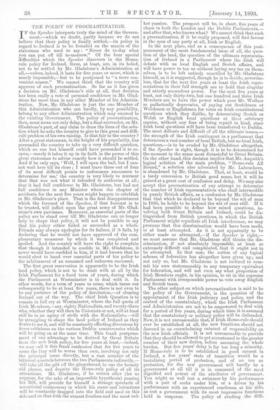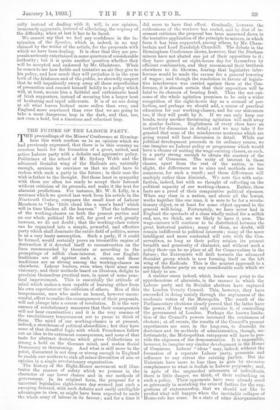THE POLICY OF PROCRASTINATION. I F the Speaker interprets truly the
mind, of the Govern- ment,—which we doubt, partly because we do not believe that their policy is finally settled,—its policy in regard to Ireland is to be founded on the maxim of the statesman who used to say : "Never do to-day what you can put off till to-morrow." Of the four special difficulties which the Speaker discovers in the Home. rule policy for Ireland, three, at least, are, in its belief, not to be settled by Mr. Gladstone's Administration at all,—unless, indeed, it lasts for five years or more, which is nearly impossible,—but to be postponed to "a more con- venient season." We cannot think that the country will approve of such procrastination. So far as it has given a decision on Mr. Gladstone's side at all, that decision has been really a vote of personal confidence in Mr. Glad- stone far more than in any other Member of his Adminis- tration. Now, Mr. Gladstone is just the one Member of this Administration who can hardly, by any possibility, belong to any other Administration which may succeed. to the existing Government. The policy of procrastination, then, must mean not only delay, but a final surrender, on Mr. Gladstone's part, of any claim to draw the lines of the solu- tion which he asks the country to give to this great and diffi- cult problem of his own raising. Is that fair to the country ? After a great statesman, in the height of his popularity, has persuaded the country to take up a very difficult question, which no one but himself could have persuaded it to re- open,—surely it takes it up in its faith in the power of this great statesman to advise exactly how it should be settled. And if he only says, Well, I will open the ball, but I can- not wait here till its close ; I must leave three out of four of its most difficult points to unforeseen successors to determine for me,' the country is very likely to murmur that that was not what it intended. to authorise at all that it had full confidence in Mr. Gladstone, but had not full confidence in any Minister whom the chapter of accidents for the next five years might happen to establish in Mr. Gladstone's place. That is the first disappointment which the forecast of the Speaker, if that forecast is to be trusted, will inflict upon the great army of Mr. Glad.- stone's own partisans. Moreover, as essential parts of the policy are to stand over till Mr. Gladstone can no longer help to shape that policy, it will not be possible to say that his policy either failed or succeeded as a whole. Friends may always apologise for its failure, if it fails, by declaring that he would not have approved of the com- plementary measures by which it was completed and spoiled. And the country will have the right to complain that though it intended to confide in Mr. Gladstone, it never would have confided. in him, if it had known that he would elect to hand over essential parts of his policy to the arbitrament of an unnamed and unknown successor.
The first great reservation is apparently to be the Irish land policy, which is not to be dealt with at all by the Irish Parliament for a fixed term of years, during which the Parliament at Westminster is to deal with it. In other words, for a term of years to come, which turns out subsequently to be at least five years, there is not even to be any pretence of the policy of devolution,—of clearing Ireland out of the way. The chief Irish Question is to remain in full cry at Westminster, where the full quota of Irish Members,—say, eighty Nationalists, and. twenty-three who, whether they will then be Unionists or not, will at least still be in an agony of strife with the Nationalists,—will be struggling to shape the land. policy of Ireland as they desire to see it, and will be constantly effecting diversions by fierce criticisms on the various Dublin controversies which will be going on at the same time. This frank postpone- ment of any advantage to be derived by Great Britain from the new Irish policy, for five years at least,—indeed, we may call it this frank confession that for five years to come the fray will be worse than ever, involving not only the principal issue directly, but a vast number of the bitterest quarrels between the two Parliaments indirectly,— will take all the gilt off the gingerbread, to use the homely old. phrase, and. deprive the Home-rule policy of all its attractions. Mr. Gladstone, if he retires after (let us suppose, for the sake of an. impossible hypothesis) passing his Bill, will provide for himself a strange spectacle of sensational controversy in which his name and intentions will be constantly dragged into the field and used on this side and on that with the utmost freedom and the most red.- hot passion. The prospect will be, in short, five years of chaos in both the London and the Dublin Parliaments,— and. after that, who knows what? We cannot think that such a procrastination, if it be really proposed, will find favour in the eyes of any party at all, Irish or English. In the next place, and as a consequence of this post- ponement of the most fundamental issue of all, the ques- tion of the land, the question of the ultimate representa- tion of Ireland in a Parliament where the Irish will debate with us local English and. Scotch affairs, and will have power to tax us without laying any tax on them- selves, is to be left entirely unsettled by Mr. Gladstone himself, as it is suggested, though he is to decide, neverthe- less, that for the next five years at least the Irish repre- sentatives in their full strength are to hold that singular and utterly anomalous power. For the next five years at least, not only thirty-two, but one hundred. and three Irish Members are to have the power which poor Mr. Wallace so pathetically deprecates, of paying out Scotchmen or Welshmen or Englishmen for votes on Irish constitutional questions which they dislike, by determining Scotch or Welsh or English local questions at their arbitrary caprice, without any fear of being repaid in kind, since Irish local questions will have been transferred to Dublin. The most delicate and difficult of all the ultimate issues,— the strength of the Irish contingent in a parliament that determines a vast number of local British, but no local Irish, questions,—is to be evaded by Mr. Gladstone altogether, if the Speaker is right, though it is to be determined for the moment in the sense most distastcful to Great Britain. On the other hand, this decision implies that Mr. Asquith's logical solution of the main problem, "Rome-rule All Round," a solution also advocated by Mr. Labouchere is abandoned by Mr. Gladstone. That, at least, would be a tardy concession to British good sense, but it will be gained at a great cost of confusion and. delay. We may also accept this procrastination of any attempt to determine the number of Irish representatives who shall intermeddle in purely British affairs, as a confession by Mr. Gladstone that that which he declared to be beyond the wit of man in 1886, he holds to be beyond the wit of man still. If it had been possible to define how mixed questions, in- volving both Great Britain and Ireland, could be dis- tinguished. from British questions, in which the British Parliament might repudiate all Irish interference, we may presume that this discrimination would. have been made, or at least attempted. As it is not apparently to be either made or attempted,—if the Speaker is right,— we must assume that Mr. Gladstone still thinks the dis- crimination, if not absolutely impossible, at least so extremely difficult and complicated, that it ought not to be attempted. In that case, the notion of any logical scheme of federation has altogether been given up ; and. not only so, but Mr. Gladstone is not inclined to com- mit his own statesmanship to any temporary equivalent for federation, and. will not even say what proportion of Irish Members ought, in his opinion, to sit in the supreme Parliament with irresponsible power to vote away English and Scotch taxes.
The other subject on which procrastination is said to be the policy of the Government, is the question of the appointment of the Irish judiciary and police, and the control of the constabulary, which the Irish Parliament and Administration are not to be empowered to deal with for a period of five years, during which time it is assumed that the constabulary or military police will be disbanded. Now, it is not unreasonable that, if Irish Home-rule should ever be established at all, the new functions should not descend in an overwhelming cataract of responsibility on the new Irish officials. It is not unreasonable to provide that they should be allowed to get accustomed to the greater number of their new duties, before assuming the whole burden. But five years' delay is far too long a minority. If Home-rule is to be established in good earnest in Ireland, a five years' state of transition would be a tantalising period of probation, and. of no use as probation, for the new government will hardly be a government at all till it is in. command of the most dignified and potent of the attributes of government. You might as well test a swimmer by his performance with a pair of corks under him, or a driver by his performance with an experienced coachman at his side, as test a government with its most impressive functions held in suspense. The policy of evading the diffi- culty instead of dealing with it, will, in our opinion, immensely aggravate, instead of alleviating, the urgency of the difficulty, when at last it has to be faced. We cannot say that we feel any confidence in the in- spiration of the Speaker, which is, indeed, in no way claimed by the writer of the article, for the proposals with which we have been dealing. It is clear that they are pro- posals seriously entertained in some quarters of considerable authority ; but it is quite another question whether they will be accepted and endorsed by Mr. Gladstone. When he comes to see how feeble and tentative an air they give to his policy, and how much they will prejudice it in the eyes both of the Irishmen and of the public, we shrewdly suspect that he will impatiently sweep away all these superfluities of precaution and commit himself boldly to a policy which will, at least, secure him a faithful and enthusiastic band of Irish supporters, instead of securing him a larger host of hesitating and tepid adherents. It is of no use doing at all what leaves Ireland more sullen than ever, and England more convinced than ever that we are going to take a most dangerous leap in the dark, and that, too, not even a bold, but a timorous and reluctant leap.



































 Previous page
Previous page